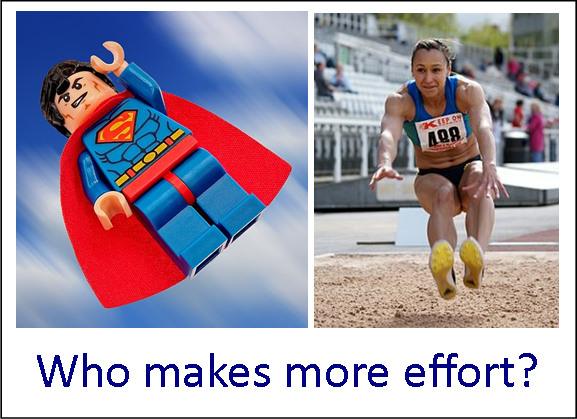Reading time: 5 minutes
Having spent the previous year studying “Resilience” and the nature of this, I thought this year I would look at Growth Mindset and how this could further develop the work I had previously undertaken. I had heard people talking about a Growth Mindset but was never really sure what this was. So, where to begin?
I started by reading the book “Growth Mindset Pocketbook” by Barry Hymer and Mike Gershon which explains the research of Carol Dweck on students’ motivation and mindset and how this can have a transformational impact on them. It made for an interesting read and allowed me to decide on an area to focus on. I decided to choose feedback and the power of language as this fit closely with my previous work on resilience.
As a starting point I came across this idea:

It was certainly food for thought. Initially I thought it was Superman, he fights evil every day, has to fly at super speed to save Lois, he is really putting himself out! Then I started to think about Jessica Ennis Hill, look at the determination on her face. But she’s just good at running right, so it’s easy for her. Wrong. Ennis Hill has spent years in training, she was not born with an innate ability to run that fast or jump that far, she had to put in effort, she had to persist, sacrifice, endure disappointment, fail and work hard in order to reach the success she has had. Oh my goodness! Ennis Hill works harder than Superman! That was quite a revelation.
So I began to think about what I was doing in my classroom, who and what I was praising and I came across this good advice:

I began to think about the language I was using in my classroom. For example, instead of saying “Excellent. Tu es très intelligent” (Excellent. You are very clever), I changed this to “Excellent. Tu as très bien travaillé” (Excellent. You have worked very well). I also introduced phrases that I wanted the students to use in class to promote a growth mind-set and had posters of the following:


And in certain tasks I would give them a “Levels of Understanding” sheet at the start of the lesson which they would fill in and this would assess their current knowledge and progress throughout the lesson:

When these things were embedded I needed to come up with a clearer way to assess the effort the students were making and the mindset they had. I did further research and found a wonderful chart created by Peter Morris and Sheila Claxton which gave four levels of descriptor against the headings; Resilence, Independence, Self-management, Response to feedback, Response to challenge and Response to setbacks. I kept this on my desk in order to refer to it throughout the course of my lessons.
I would also share a slide with students at the start of each lesson to remind them what my expectations were and offering them a key message or prompt in relation to effort or the need to overcome failure in order to succeed to allow a growth mindset to be cultivated.
This allowed me to show students that while failure was accepted, it is what they did when they failed that mattered i.e. you often have to fail in order to succeed at something, therefore creating an environment with a growth mind-set.
I originally focussed my efforts on a set two Year 9 class that had particularly low aspirations and would often just give up on a task and say a range of things from “It’s too hard”, “I can’t speak Spanish” or “I can’t do it”. Using more focussed and positive feedback, praising effort rather than outcome, I noticed a big change in this group’s attitude. Every single student would take on a challenge, work independently either alone or in a group and they were not afraid to fail. In fact, they would fail time and time again but when their efforts were praised they took this on the chin and continued to strive for success. It was a wonderful transformation and the class environment was that of hard working individuals not afraid of a challenge.
However that’s not all! The feedback I was giving my Year 9 class started to filter into other lessons. In fact it was practically impossible for this to not happen. The power of this language was immense. My other classes started to accept challenges, work independently and accept failure as part of the learning process rather than a stumbling block. In my observations this year the feedback I received every time was that there was lots of challenge in the lessons, students were resilient and always strived for success rather than giving up and accepting failure. For example, in a Year 7 French lesson they were given extracts taken directly from the book “Le Petit Prince”, which is a very challenging text. Using previous notes they were able to put the story in order with no help from the class teacher. This was wonderful to see and I felt a real sense of achievement.
In conclusion, I discovered that when trying to foster a growth mindset through feedback and the power of language, I had actually ended up creating a group mindset. That is to say, the two go hand in hand, there cannot be one without the other. If you praise students for their efforts, praising progress rather than outcome, enabling, nurturing and encouraging a growth mindset, you create a learning culture amongst the pupils. A group mindset which can only lead to success.
References:
Barry Hymer and Mike Gershon – Growth Mindset Pocketbook
Rachel Wellfair – Growth Mindset Phrases
Aysin Alp – Growth Mindset
Peter Morris – ALL Conference 2014
Featured image: ‘Clouds’ by Geralt on Pixabay. Licensed under Creative Commons CC0

